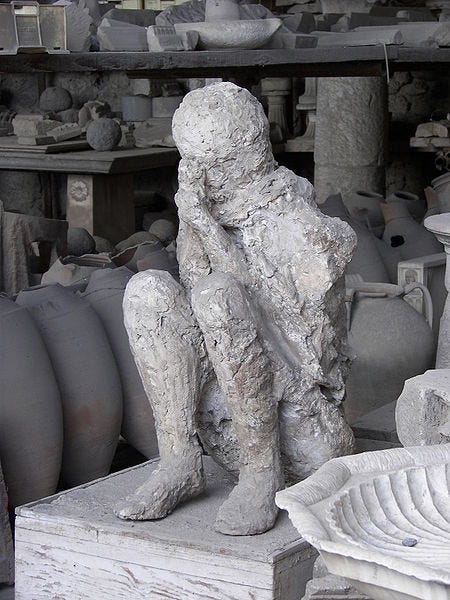Pompeii - the city of ashes
I would like to share with you some information about Pompeii, the city which witnessed one of the biggest volcanic disasters of antiquity.
Pompeii is a city in Campania, Italy, approximately 20 kilometres south-east of Naples. It was founded in the 7th century BC. The greatest development of Pompeii took place in the 1st century CE. The local people made a living through trade that was very animated because the city had its own seaport. The development of the Pompeii was first inhibited by an earthquake in 62 CE followed by the eruption of the volcano Vesuvius in 79 CE. Imagine, that the locals had no idea that Vesuvius was a volcano.
There was a huge eruption and the wind blowing towards Pompeii blasted hot volcanic ash and burning hot stones, which set fire to buildings and, together with the poisonous gases, killed the people. The eruption lasted three days and covered the city with volcanic ash 5-6 thick, which preserved bodies of people, animals, buildings, and objects. A cloud of smoke and ashes reached Rome, 200 km away.
The remains of the Pompeii were discovered by accident at the end of the 16th century while digging the canal, and in 1748 the uncovering of the city began, which continues to this day. Some of the objects, mosaics, and statues are authentic while the others are reconstructions. Some of the originals are situated in the National Archaeological Museum of Naples.
If you visit Pompeii, you will surely be impressed by the plaster casts of the inhabitants. The ashes covering Pompeii solidified quickly, retaining the shape of buried bodies inside. The plaster was poured through a small opening and filled the entire space. After the plaster had set, the ash layer was removed, revealing the castings of bodies, objects, building equipment (e.g. doors), etc.
Unfortunately, over the centuries, the ruins of Pompeii underwent gradual destruction caused by both people’s actions (bombing during World War II, looting, acts of vandalism, littering) and nature (earthquakes, changeable weather conditions). However, in recent years work in Pompeii has been focusing on conservation, protection, and documentation of monuments.
When you are in Pompeii, it is worth seeing many places which will provide you information about locals’ way of living:
- Forum
- Antiquarium
- Stabian
Baths
- Amphitheatre
- Theatres (Teatro Grande and Teatro Piccolo)
- House of the Faun
- and many others ;)



Komentarze
Prześlij komentarz